Rio 2016: Does the Chinese public have a victim narrative?
- Published
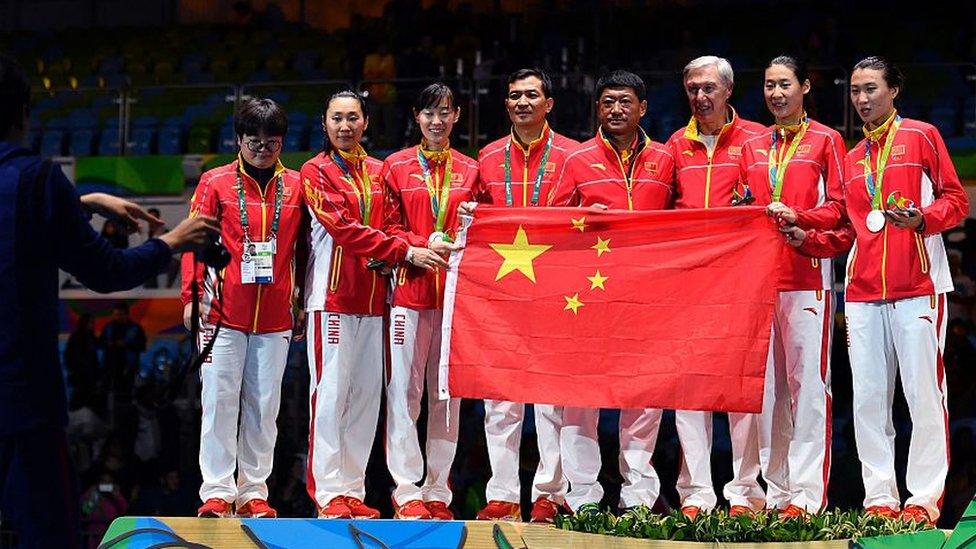
According to one poll, more than 80% of the Chinese public think Rio's judges have a sinister bias against China
One week into the Olympic Games and Chinese patriots have a lot of complaints.
A brief shortlist might start with judges biased against Chinese athletes. In all Rio venues, the points of the gold stars on the Chinese national flag were misaligned.
On one occasion where a Chinese and US athlete drew for bronze, the Chinese flag was positioned below the American flag. An Australian and a French swimmer made doping allegations against a Chinese swimmer and failed to apologise.
And back to the beginning, China's gymnasts were robbed, China's weightlifters were robbed, China's swimmers were robbed.
The volleyball team only avoided being robbed by standing up to Swiss bullying (Yes that's a nation of 8 million bullying one of 1.4 billion, 175 times bigger).
What is the root of all this paranoia?
"As we mature in mentality, learn how to appreciate competition, and become able to calmly applaud our rivals, we showcase the confidence and tolerance of a great country," suggested China's state broadcaster CCTV on day one of the Rio Olympics. If only.
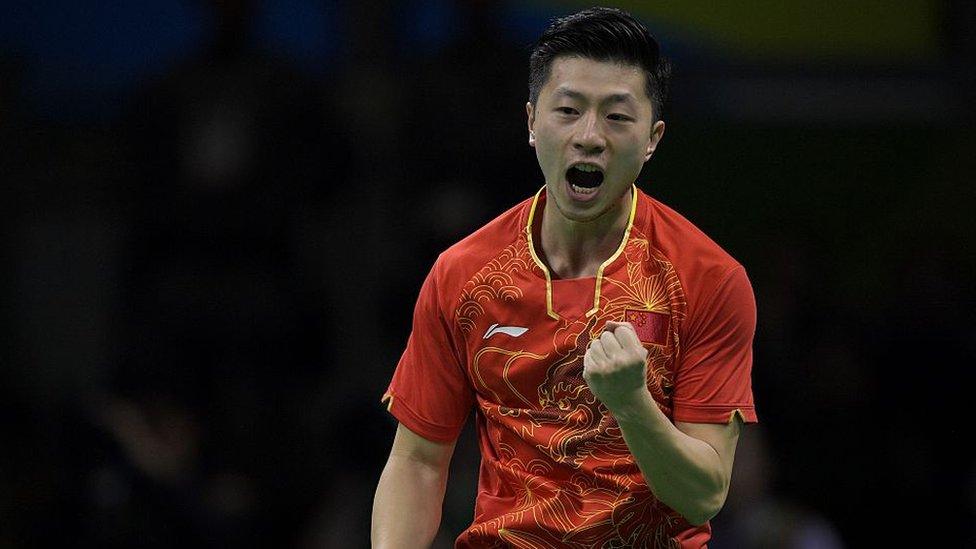
Chinese athletes are bringing gold and glory on the international sporting stage
On the face of it, the Chinese public have every reason to display confidence and tolerance. Their athletes are bringing gold and glory on the international sporting stage just as their political leaders prepare to welcome the rich world at the G20 summit of powerful economies.
But if CCTV believes tolerance and confidence should be the overriding Olympic mood, it needs to get that message across to its viewers.
According to one poll, more than 80% of the public think Rio's judges have a sinister bias against China. Only 16% believe other countries might equally be the victim of bad calls.

Read more:

In one of the more unusual stories, Chinese sports fans have taken Japanese table tennis player Ai Fukuhara (R) to heart
The Japanese Olympian who stole Chinese hearts
Olympic divers swoop into plastic cup in viral gif viewed millions of times
Fu Yuanhui: China's disarming and expressive Olympic swimming star
China's Olympic social media winners and losers online
Rio Olympics are worst ever, say Chinese social media users
China demands apology for Australian swimming 'drug cheat' slur

On Thursday night, the Communist Party flagship the People's Daily published a commentary designed to temper this script.
It pointed out that Olympic history is fraught with umpiring controversies, that other nations too often feel wronged and that it is a mistake to look at some facts and ignore others.
But truly China's state media only have themselves to blame. If the Chinese public have an ineradicable victim narrative it is of their own creation.
Null and void
The Olympics come a month after the Hague tribunal ruling on the legality of China's claims in the South China Sea, and the tsunami of official outrage over that ruling still conditions the public mood.
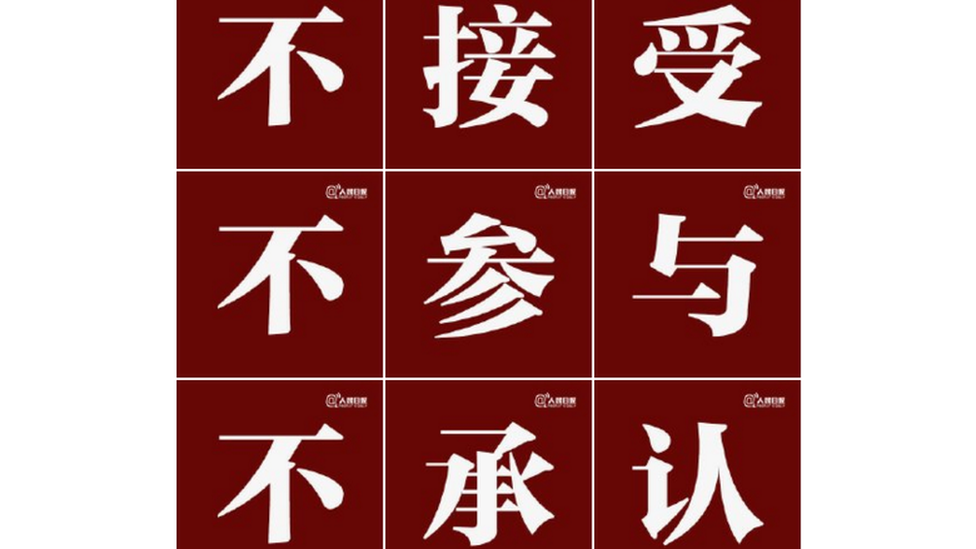
"Won't accept, won't participate, won't recognise", reads this picture on Weibo which was posted as a reaction to the South China Sea ruling
The message then was that a ruling in international law which didn't go China's way was thereby null and void. Moreover, the judges are brainless or paid, or both, so the narrative went.
If rulings in international law are optional for the Chinese government then who can be surprised if the Chinese public applies the same principle to rulings in sport?
Especially when the run-up to the Olympics saw an almost daily slew of state-sanctioned viral videos warning that a giant western conspiracy is afoot to bring China down and turn it into a second Syria.
If any foreigner is plotting against China in Rio they're not making a very good job of it. At the time of writing, China was second on the medals table. Only at home in 2008 did the Chinese team top the table, so the evidence of a sinister anti-China bias among Olympic judges seems fragile.
Honesty, enthusiasm, spontaneity
But one good thing about blaming foreign judges is that it takes some of the pressure of expectation off Chinese athletes.
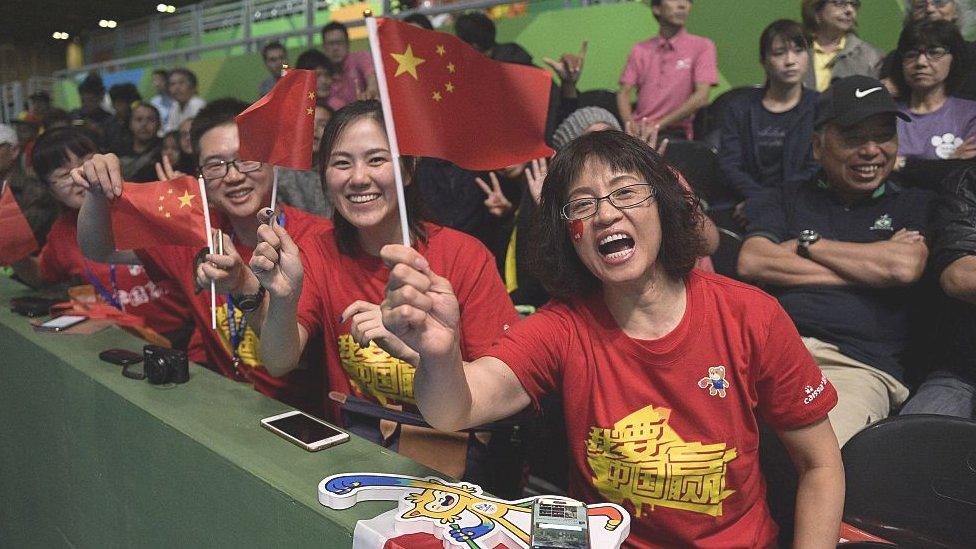
Online fans of Chinese athletes have taken to posting and sharing content of their favourite athletes on microblogging site Weibo
Over the past week, some did still make tearful apologies to the nation for underperforming; others dedicated their medals to the nation when they won. Like weightlifter Long Qingquan who spoke with almost Cultural Revolutionary fervour,
"I couldn't feel the weight on my shoulders because my country gave me willpower that was greater than the weight".
But the athlete who's really touched fans hearts falls into neither of these winner or loser stereotypes.
Instead swimmer Fu Yuanhui said she was thrilled with bronze and perhaps her arms were too short to expect more. She did not blame mind games by rival athletes or a sinister plot by anti-China judges. She said training had been a slog that felt almost unbearable at times.
Honesty, enthusiasm, spontaneity: China would do well to encourage more athletes to be themselves.
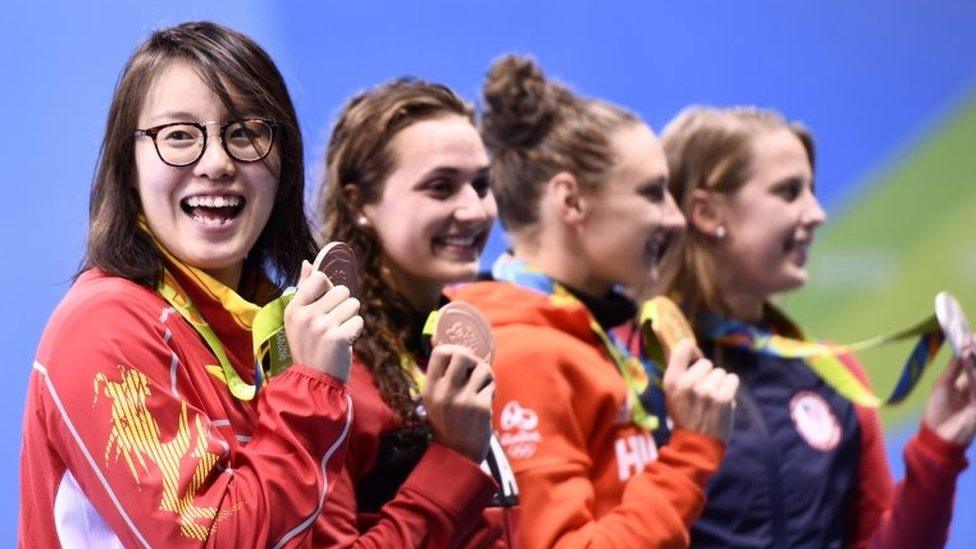
A satisfied smile on the podium from Fu Yuanhui (left)
Or their best selves. Because at the other end of the soft power scale is Sun Yang.
Another swimmer, Sun has got into a sensational row with Australian rival Mack Horton over doping allegations. The dominant Chinese view of this is that Horton was rude and unfair. I'm not in a position to judge.
But Sun Yang was clearly unpopular with athletes and coaches from several countries as there had been several complaints about disruptive behaviour in training.
And since the incident at the beginning of the week, the torrent of abuse levelled at the Australian on social media has been shocking. Horton is a snake, a racist and more. Australia is on the fringe of civilisation, a former penal colony.
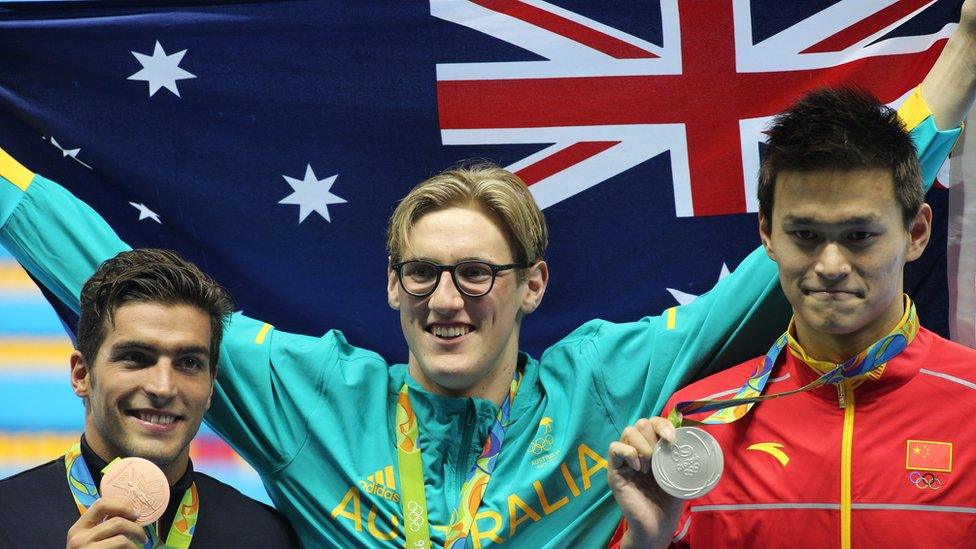
Italy's Gabriele Detti, Australia's Mack Horton and China's Yang Sun take a stand on the podium
Herd mentality?
Why do Chinese fans take it all so personally? And why isn't there a spectrum of opinion? It's legitimate to point out that Chinese athletes train hard and deserve respect.
It's also legitimate to point out that China has mounted a long hard campaign to root out doping. But why aren't there more Chinese voices acknowledging that doping has been a terrible scourge for the national swimming team in the past, or that Sun Yang does not have an unblemished record? With Friday's news that a Chinese swimmer, Chen Xinyu, has now failed a Rio drugs test, perhaps the self-reflection will begin.
If it doesn't, what hope for reflection on the more dangerous differences with other nations? In my view, this too relates back at the most profound level to China's absence of free debate and to the most recent example of driven herd mentality over the South China Sea dispute.

The sea is a major shipping route and home to fishing grounds that supply the livelihoods of people across the region
After the Hague ruling, China was angered by a joint statement from the US, Japan and Australia upholding international law and freedom of navigation.
Again the propaganda machine whipped up public rage. Only last week, one state owned newspaper said Australia was a "paper cat" and that if it got involved in the South China Sea it would become "an ideal target for China to warn and strike".
Since then Australia and Vietnam have fallen victim to significant cyber attacks, Japan has been dismayed by a fleet of Chinese fishing boats and coastguard vessels in contested waters,
South Korea has been targeted for economic punishment after its decision to deploy an anti-missile technology and China's state broadcaster has declined even to acknowledge the existence of the Philippines team at the opening ceremony of the Olympic Games.
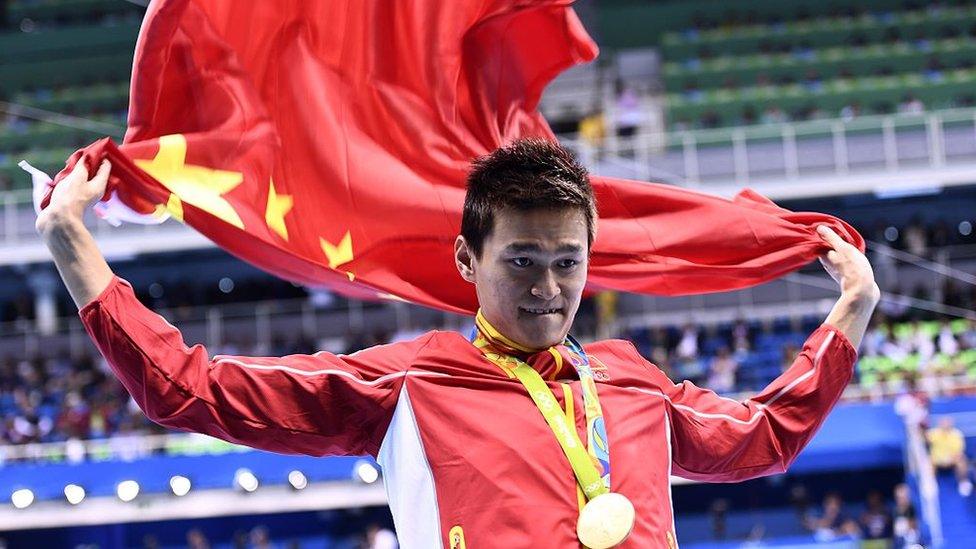
Media and social media have been closely following the ups and downs of swimmer Sun, especially since his seemingly ungraceful loss in the 400m freestyle
In this climate of multi-dimensional antagonism, it's hardly surprising that the Chinese public approach a festival of sport at a fever pitch of wounded national pride, ready to see sinister plots at every turn.
Perhaps Fu Yuanhui could bring her example to bear and set three "do nots" for Team China (and the rest) on the field at Rio and every other world stage: don't be sore losers on the rare occasions when you lose; don't indulge in paranoid groupthink; and don't treat international rules as a pick and mix. Come on China! 中国加油!
- Published9 August 2016
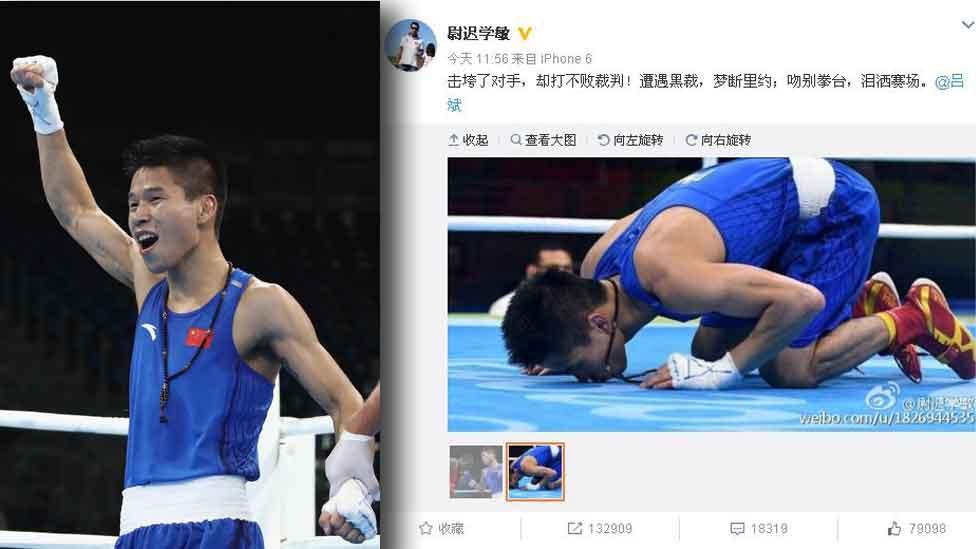
- Published8 August 2016
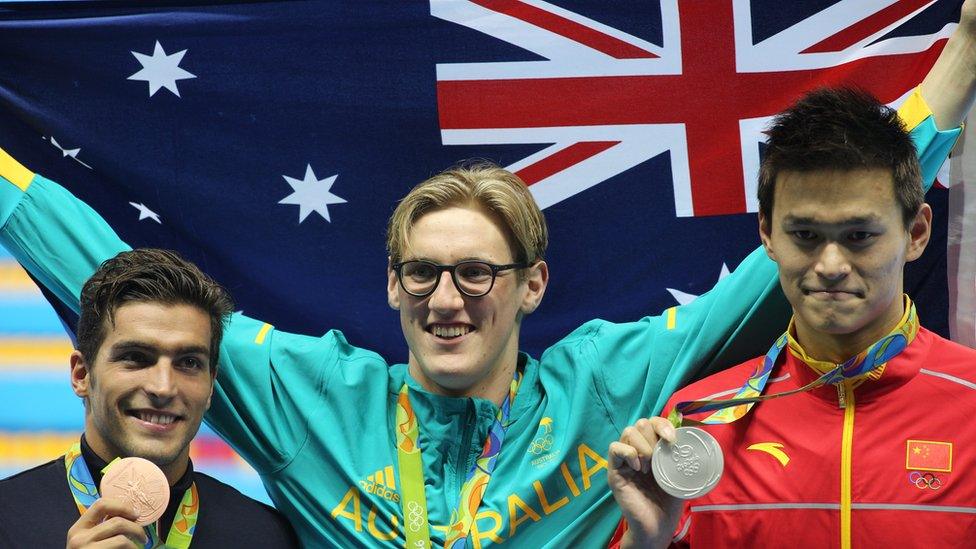
- Published10 August 2016
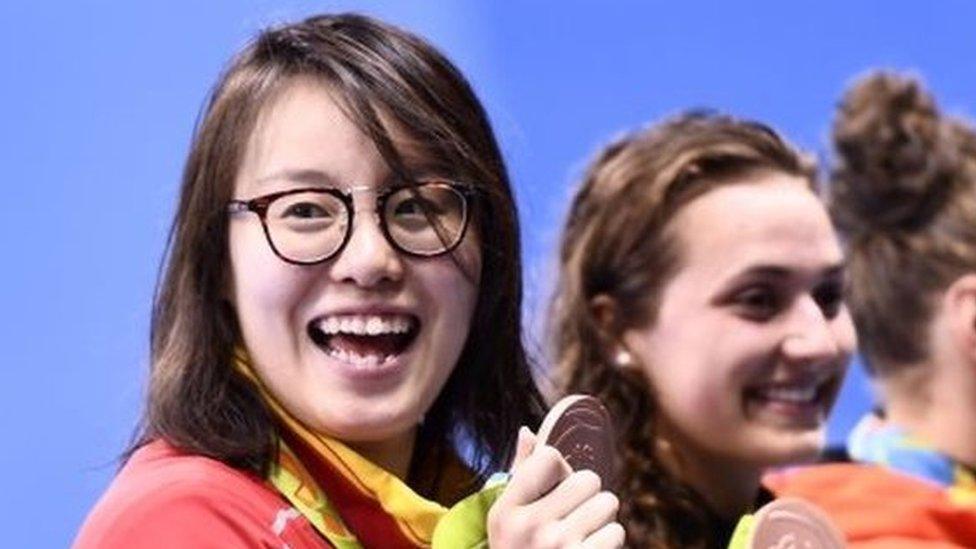
- Published13 July 2016
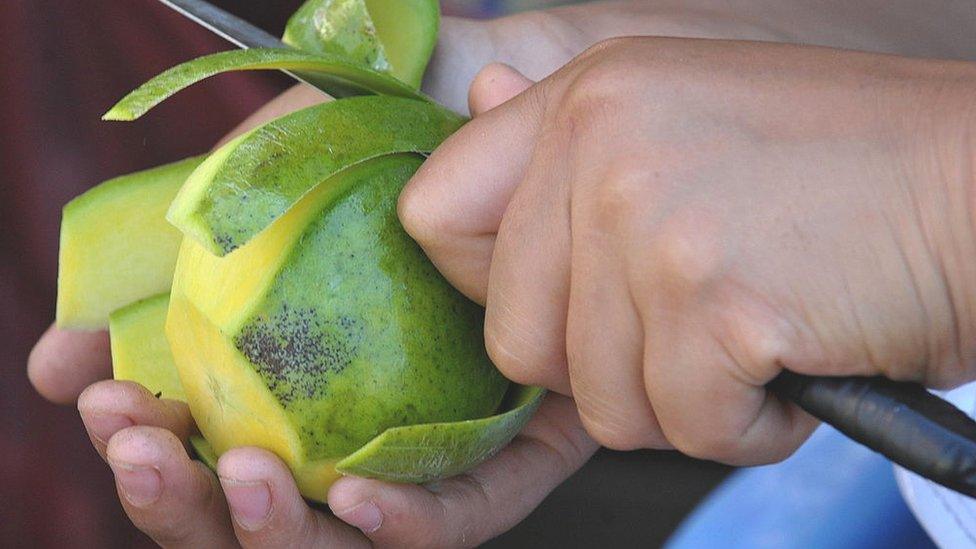
- Published7 July 2023

